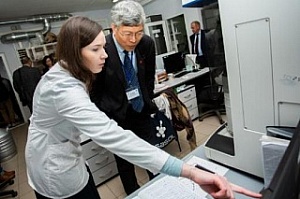Four TSU educational programs for chemists have passed international professional and public accreditation for a maximum period of 6 years. They are assigned a 5-star rating and an Excellent Quality mark. The decision was made by the National Accreditation Council of the National Accreditation Center and the Center for the Assessment of Higher Education under the Ministry of Education of China. This is the first Russian-Chinese accreditation of chemistry programs at a Russian university. The certificate obtained testifies to the high quality of chemistry education at TSU and will help to attract international applicants, especially from countries in Southeast Asia.
Four TSU programs were accredited: “Chemistry” (bachelor's degree, 04.03.01 Chemistry), “Fundamental and Applied Chemistry of Substances and Materials” (master’s degree, 04.04.01 Chemistry), “Translational chemical and biomedical technologies” (master’s degree, 04.04.01 Chemistry), and "Fundamental and Applied Chemistry" (specialist degree, 04.05.01 Fundamental and Applied Chemistry). Experts from Russia and China recognized them as complying with international education quality standards. Information about these programs will be posted on the European Register of Accredited Programs.
- Obtaining Russian-Chinese accreditation testifies to the high quality of chemistry education at TSU and its compliance with labor market requirements and international practices in the chemical industry, - said Tatyana Rudenko, director of the Center for Social, Professional, and International Accreditation of Educational Programs at TSU. - For TSU, being in the European register of accredited programs expands not only the boundaries of knowledge about Russian education and the best programs, but also increases the degree of trust on the part of applicants. Also, the countries of Southeast Asia are of great interest to the university in terms of attracting international students and the formation of new scientific ties.
The International Commission particularly appreciated the proactive approach and corporate coherence in the management of educational programs, the high level of effectiveness of research, and the availability of a professional base for practical work.

